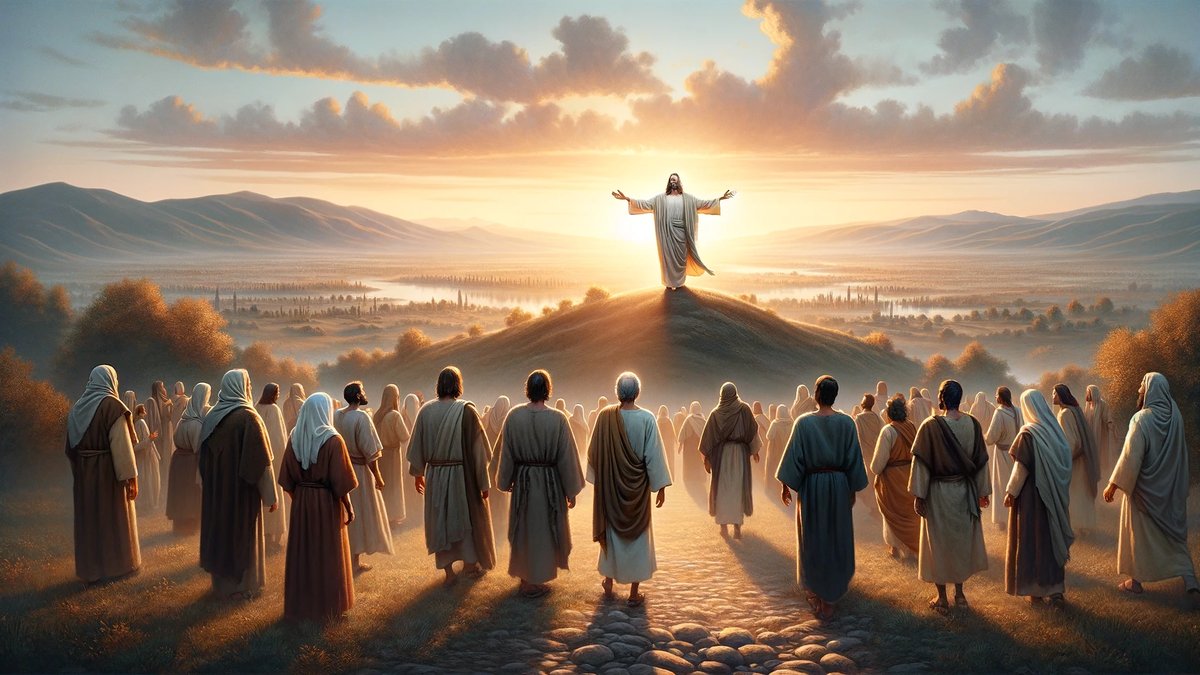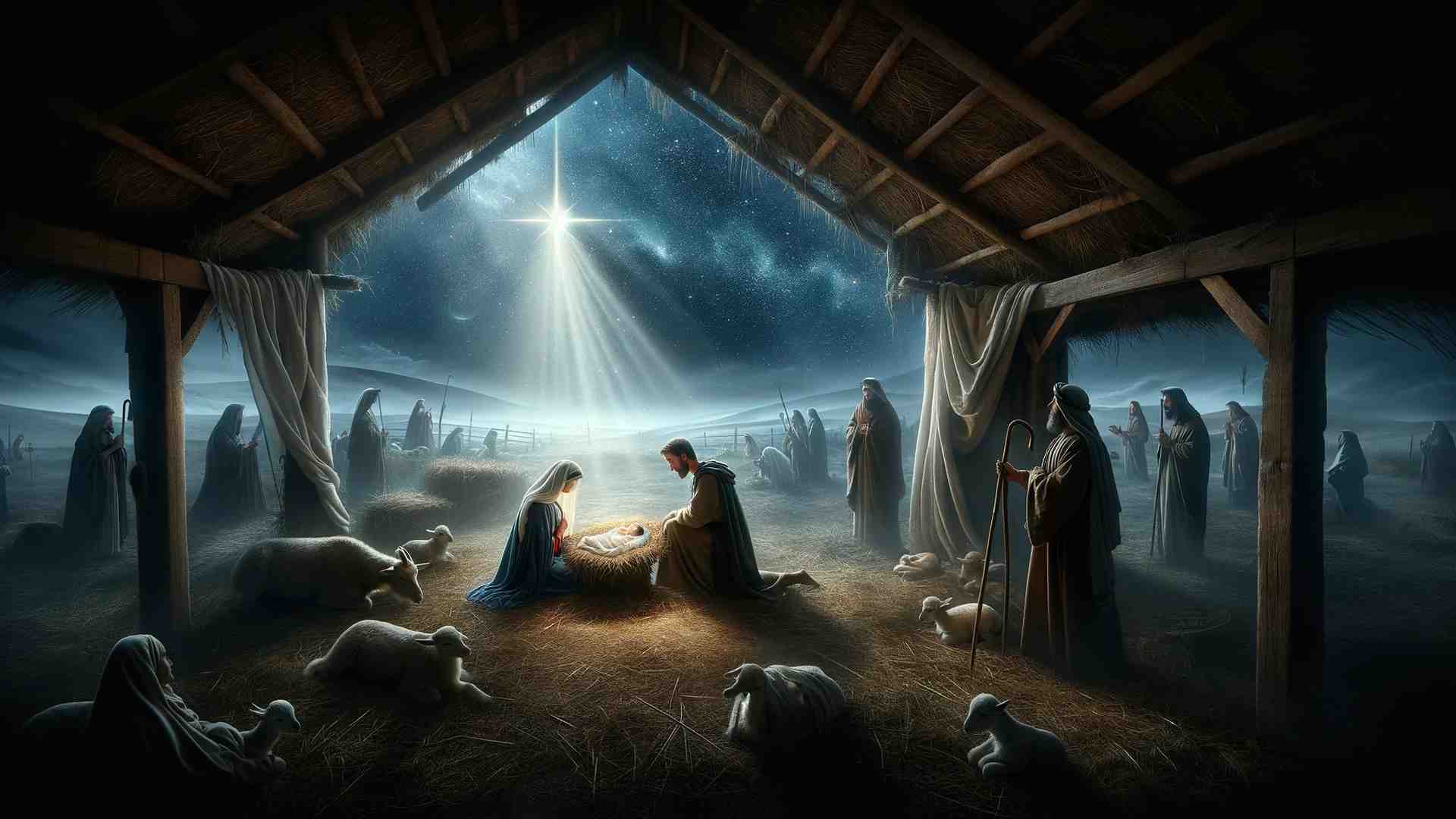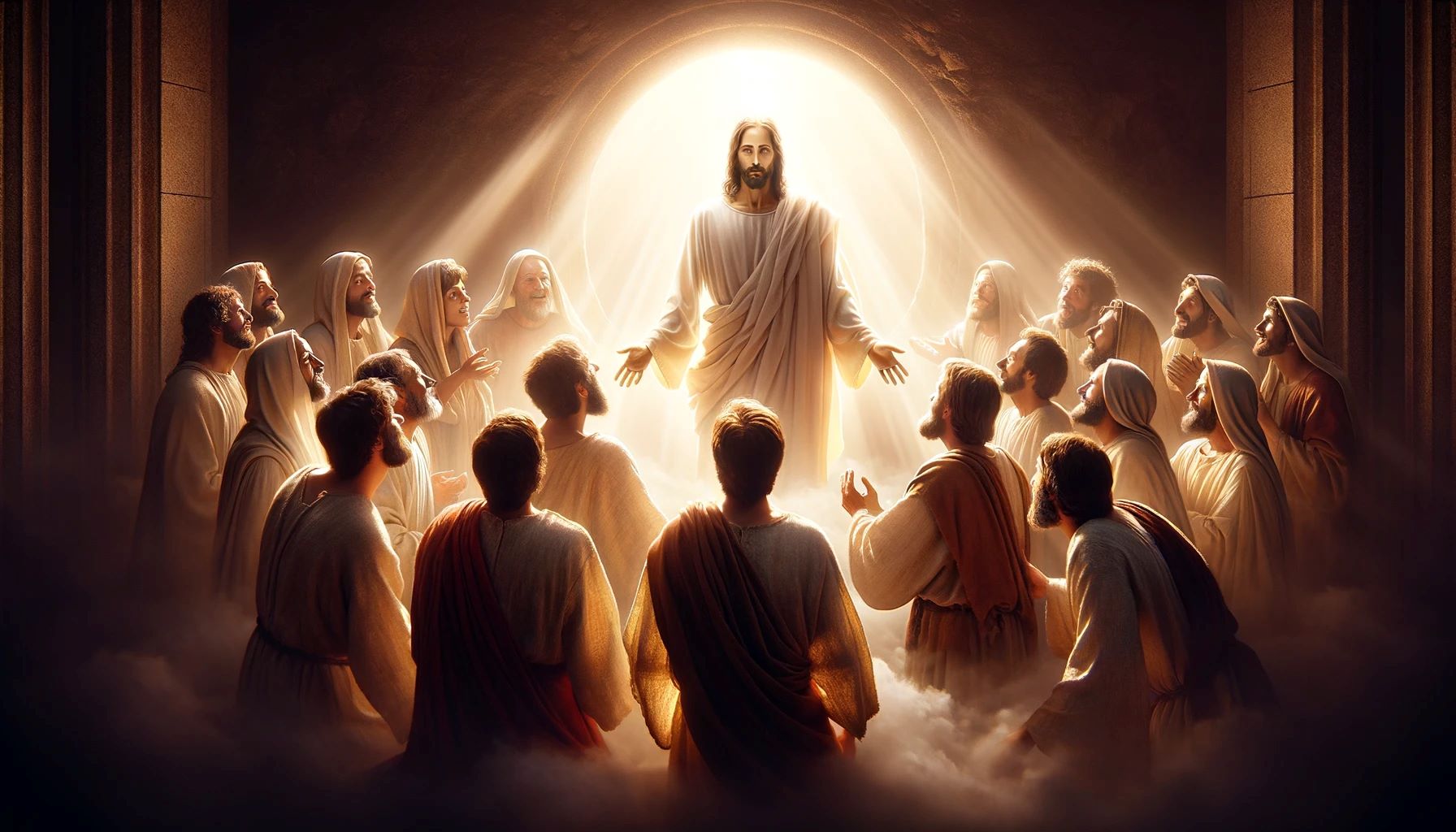Home>Christian Videos>Bible Stories>Why Do The Jews Not Believe In Jesus Christ


Bible Stories
Why Do The Jews Not Believe In Jesus Christ
Published: March 3, 2024
Peter Smith, Editorial Director at Christian.net, combines deep insights into faith, politics, and culture to lead content creation that resonates widely. Awarded for his contributions to religious discourse, he previously headed a major organization for religious communicators, enhancing dialogue on faith's societal impacts.
Discover the reasons behind the Jewish belief about Jesus Christ and explore the significance of this perspective in Bible stories. Uncover the historical and religious context that shapes their faith.
(Many of the links in this article redirect to a specific reviewed product. Your purchase of these products through affiliate links helps to generate commission for Christian.net, at no extra cost. Learn more)
Table of Contents
The Historical Context of Jewish Beliefs
The historical context of Jewish beliefs plays a crucial role in understanding why Jews do not believe in Jesus Christ. Here are some key points to consider:
-
Ancient Origins: Jewish beliefs have ancient origins, dating back thousands of years. The foundational texts of Judaism, including the Torah and Talmud, shape the religious worldview of Jewish people.
-
Covenant with God: Central to Jewish belief is the covenant between the Jewish people and God, as outlined in the Hebrew Bible. This covenant forms the basis of Jewish identity and religious practice.
-
Experiences of Persecution: Throughout history, Jewish communities have faced persecution and discrimination, leading to a strong sense of cultural and religious identity. These experiences have shaped Jewish beliefs and attitudes towards external influences.
-
Messianic Expectations: Within the historical context of Jewish beliefs, there have been various interpretations of the concept of the Messiah. While some Jews have anticipated a future messianic figure, the criteria for this figure differ from the attributes ascribed to Jesus in Christian theology.
Understanding the historical context of Jewish beliefs provides valuable insights into the reasons behind the Jewish rejection of Jesus as the Messiah.
Read more: Why Believe In Jesus Christ
The Jewish Perspective on the Messiah
-
Messianic Expectations: In Jewish tradition, the concept of the Messiah holds significant theological and historical importance. The Messiah, or "Mashiach" in Hebrew, is envisioned as a future, righteous leader who will bring about a time of peace, justice, and the ultimate redemption of the Jewish people. This messianic figure is anticipated to fulfill specific prophecies and restore the Davidic dynasty, ushering in an era of universal harmony and spiritual renewal.
-
Criteria for the Messiah: According to Jewish teachings, the Messiah must meet certain criteria to be recognized as the fulfillment of prophecy. These criteria include being a descendant of King David, possessing an exceptional level of wisdom and knowledge of Jewish law, and successfully gathering the Jewish exiles back to the land of Israel. The Messiah is expected to facilitate the rebuilding of the Temple in Jerusalem and promote a global recognition of God's sovereignty.
-
Divergence from Christian Beliefs: The Jewish perspective on the Messiah differs significantly from the Christian understanding of Jesus Christ. While Christians view Jesus as the fulfillment of messianic prophecies, Jews maintain that Jesus did not meet the established criteria for the Messiah. From a Jewish standpoint, the messianic era has not yet commenced, and the awaited redeemer has not yet appeared in human form.
-
Continued Hope for the Messiah: Despite the historical passage of time, the concept of the Messiah remains a central tenet of Jewish faith. Jewish communities uphold the belief in the eventual arrival of the Messiah, emphasizing the enduring optimism and anticipation for the fulfillment of divine promises. This steadfast hope in the future advent of the Messiah underscores the profound significance of messianic expectations within Jewish theology and eschatology.
-
Interpretive Diversity: It is important to note that within Judaism, there exist diverse interpretations regarding the nature and attributes of the Messiah. While some Jewish traditions emphasize a more literal understanding of messianic prophecies, others adopt allegorical or symbolic interpretations, contributing to a rich tapestry of theological discourse and speculation surrounding the anticipated arrival of the Messiah.
Understanding the Jewish perspective on the Messiah illuminates the profound theological, historical, and cultural significance of messianic expectations within Jewish tradition. This perspective provides valuable insights into the distinctiveness of Jewish beliefs and the reasons underlying the divergence from Christian interpretations of the Messiah.
Differences in Interpretation of Scripture
-
Theological Framework: The differences in interpretation of scripture between Judaism and Christianity stem from distinct theological frameworks and hermeneutical approaches. Jewish exegesis emphasizes the primacy of the Hebrew Bible, or Tanakh, as the authoritative scripture, while Christian theology incorporates the New Testament alongside the Old Testament, leading to divergent perspectives on prophetic fulfillment and the identity of the Messiah.
-
Prophecy and Fulfillment: Within the realm of scriptural interpretation, Jews and Christians hold contrasting views regarding the fulfillment of prophetic passages. Christian theology asserts that Jesus Christ embodies the fulfillment of numerous messianic prophecies found in the Hebrew Bible, attributing specific events in Jesus' life to the fulfillment of ancient predictions. In contrast, Jewish interpretation maintains that these prophecies have not been realized in Jesus and await fulfillment by a future messianic figure.
-
Theological Anthropology: Another pivotal aspect of the differences in interpretation of scripture lies in the theological anthropology of Judaism and Christianity. The divergent perspectives on the nature of humanity, sin, and redemption influence the interpretation of foundational texts. Christian theology emphasizes the concept of original sin and the need for salvation through faith in Jesus Christ, while Jewish theology emphasizes individual responsibility, ethical conduct, and the pursuit of righteousness within the framework of the covenantal relationship with God.
-
The Role of Oral Tradition: In addition to the written scripture, the role of oral tradition and rabbinic teachings significantly shapes the interpretive lens of Jewish scripture. The Talmud and Midrash, as well as the teachings of rabbinic sages, contribute to the multifaceted interpretation of biblical passages within Judaism. Conversely, Christian interpretation often relies on doctrinal exegesis and theological commentary from the early church fathers and subsequent theologians, reflecting the development of Christian theological traditions alongside the scriptural text.
-
Eschatological Perspectives: The divergent eschatological perspectives of Judaism and Christianity also influence the interpretation of prophetic passages and the portrayal of the future redemption. Christian eschatology often centers on the second coming of Christ and the establishment of the kingdom of God, as depicted in the New Testament, while Jewish eschatology emphasizes the ultimate vindication of God's sovereignty, the ingathering of the exiles, and the advent of the messianic era as delineated in the Hebrew Bible.
Understanding the differences in interpretation of scripture provides valuable insights into the theological, historical, and cultural distinctions between Judaism and Christianity. These differences underscore the diverse interpretive lenses through which foundational texts are approached, contributing to the distinct theological frameworks and beliefs within each religious tradition.
Cultural and Religious Identity
-
Historical Continuity: The cultural and religious identity of the Jewish people is deeply intertwined with their historical continuity and enduring traditions. Throughout centuries of dispersion and diaspora, Jewish communities have preserved their distinct religious practices, customs, and communal bonds, fostering a resilient cultural identity that transcends geographical boundaries and historical upheavals.
-
Ethical Foundations: Central to the cultural and religious identity of Judaism is the ethical framework delineated in the Hebrew Bible and subsequent rabbinic literature. The emphasis on ethical monotheism, social justice, and moral responsibility forms the bedrock of Jewish identity, shaping the collective consciousness and ethical orientation of Jewish communities worldwide.
-
Linguistic and Literary Heritage: The Hebrew language, as the sacred tongue of Jewish scripture and prayer, serves as a unifying linguistic element that reinforces the cultural and religious identity of the Jewish people. The rich literary heritage of Jewish texts, including the Torah, Talmud, and Midrash, embodies the collective wisdom, spiritual insights, and legal traditions that perpetuate the cultural and religious identity of Judaism.
-
Festivals and Commemorative Practices: The observance of Jewish festivals, such as Passover, Yom Kippur, and Hanukkah, along with commemorative practices related to historical events, sustains the cultural and religious identity of the Jewish community. These rituals and celebrations serve as poignant expressions of collective memory, faith, and cultural resilience, fostering a sense of continuity and belonging across generations.
-
Community Cohesion and Solidarity: The cultural and religious identity of Judaism is intricately linked to the communal cohesion and solidarity exhibited within Jewish communities. The establishment of synagogues, educational institutions, and communal organizations reinforces the interconnectedness of Jewish identity, providing avenues for religious expression, social support, and the preservation of cultural heritage.
-
Cultural Contributions and Artistic Expressions: The cultural and religious identity of Judaism is further enriched by the diverse contributions of Jewish artists, writers, musicians, and scholars. The creative expressions of Jewish identity through literature, music, visual arts, and intellectual pursuits reflect the enduring vitality and cultural vibrancy of the Jewish heritage, contributing to the global tapestry of human creativity.
Understanding the multifaceted dimensions of cultural and religious identity within Judaism illuminates the profound interconnectedness of historical, ethical, communal, and artistic elements that define the rich tapestry of Jewish heritage and faith. This cultural and religious identity serves as a testament to the enduring legacy and resilience of the Jewish people across the ages.
The Impact of Historical Persecution
-
Endurance and Resilience: The enduring impact of historical persecution on the Jewish community has been profound, shaping the collective psyche and resilience of the Jewish people. From the horrors of the Spanish Inquisition to the atrocities of the Holocaust, Jewish history bears witness to periods of intense persecution, yet the Jewish community has demonstrated remarkable endurance and resilience in the face of adversity.
-
Cultural Trauma and Memory: Historical persecution has left an indelible imprint on the cultural and collective memory of the Jewish people. The trauma of persecution, expulsion, and systematic violence has been transmitted across generations, informing the cultural narratives, rituals, and commemorative practices that serve as poignant reminders of the enduring legacy of suffering and survival.
-
Impact on Religious Identity: The experience of historical persecution has profoundly influenced the religious identity of the Jewish community. The preservation of religious traditions, the emphasis on communal solidarity, and the resilience of faith in the midst of persecution have become integral components of Jewish religious identity, reflecting a profound sense of historical continuity and spiritual fortitude.
-
Diaspora and Displacement: Historical persecution has resulted in the dispersion and displacement of Jewish communities across different regions of the world. The experience of diaspora, with its attendant challenges of adaptation, cultural preservation, and communal cohesion, has contributed to the diverse tapestry of Jewish identity and the global interconnectedness of Jewish communities.
-
Legacy of Vigilance and Advocacy: The legacy of historical persecution has engendered a profound sense of vigilance and advocacy within the Jewish community. The commitment to combating prejudice, promoting social justice, and safeguarding human rights reflects a collective determination to confront the echoes of historical persecution and uphold the dignity and rights of all individuals.
-
Interfaith Dialogue and Understanding: The impact of historical persecution has also catalyzed efforts towards interfaith dialogue, mutual understanding, and the pursuit of reconciliation. The recognition of shared values, the acknowledgment of historical injustices, and the cultivation of empathy have fostered meaningful engagements between Jewish communities and diverse religious traditions, contributing to the promotion of peace and understanding.
-
Resilient Cultural Contributions: Despite the adversities wrought by historical persecution, the Jewish community has continued to make resilient cultural contributions to the world. From literature and the arts to scientific innovation and humanitarian endeavors, the enduring legacy of Jewish creativity and intellectual vitality stands as a testament to the resilience and enduring spirit of the Jewish people.
Understanding the impact of historical persecution provides valuable insights into the enduring legacy of the Jewish community, underscoring the profound resilience, cultural vitality, and ethical fortitude that have defined the historical trajectory of the Jewish people.















